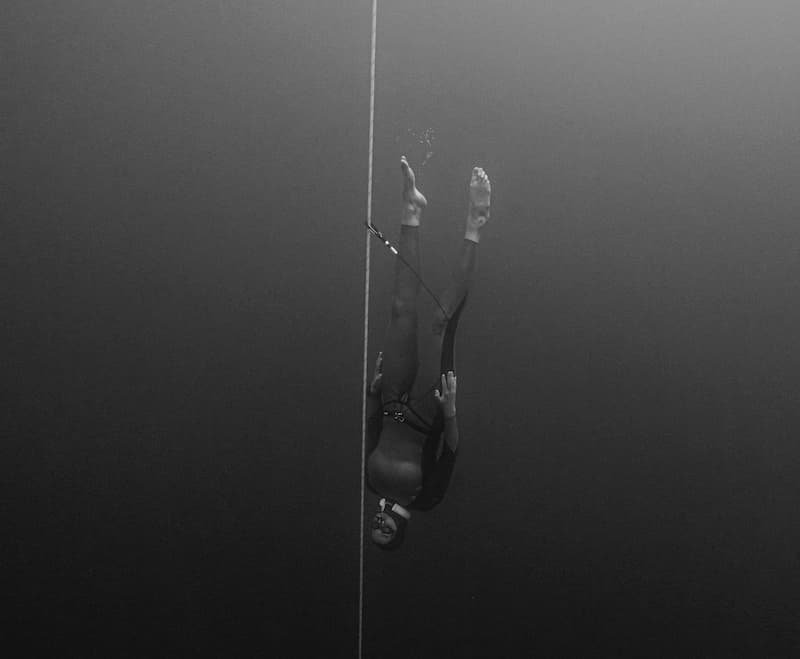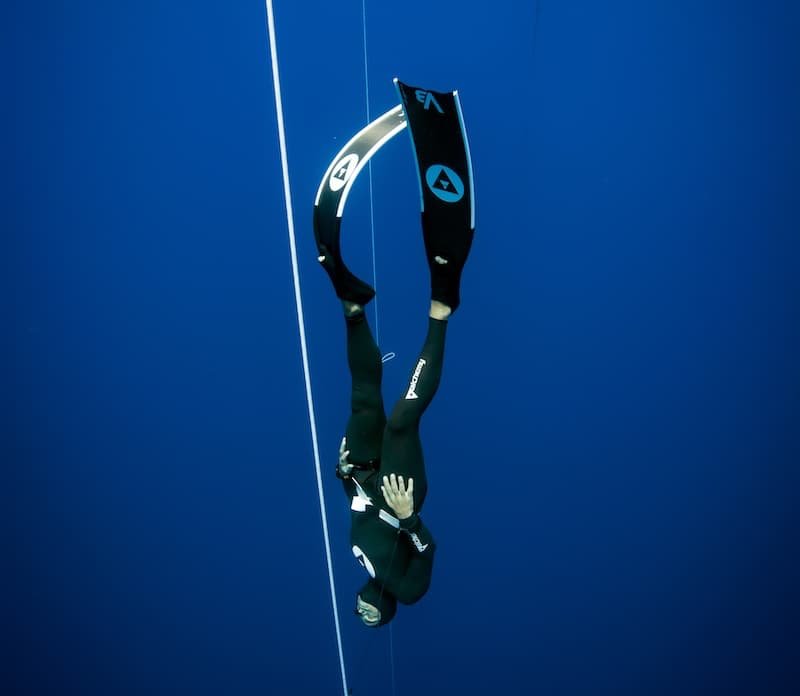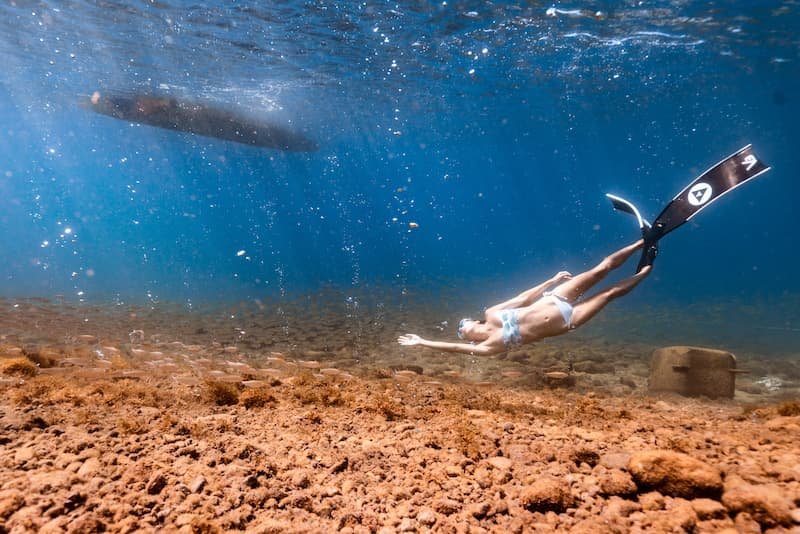
 Katie Wood
Freediver, Writer, Explorer
Katie Wood
Freediver, Writer, Explorer

 Katie Wood
Freediver, Writer, Explorer
Katie Wood
Freediver, Writer, Explorer
For many, the ocean is a place of mystery and wonder, its vastness teeming with life and secrets. Yet, for freedivers, the ocean offers something even more profound: the sounds of silence. Beneath the waves lies a unique auditory world, far removed from the cacophony of modern life. It is a realm where every sound has meaning, and silence is not just the absence of noise but a rich and layered experience.
When freedivers descend, they enter an acoustic environment unlike any other. The ocean’s soundscape is shaped by a combination of natural phenomena, marine life, and the diver’s own presence. What they hear is both alien and familiar, a symphony of the Earth’s most primal rhythms.
The ocean’s natural sounds form the baseline of this underwater symphony. Waves crashing on distant shores create a low-frequency hum that reverberates through the water. The gentle hiss of bubbles rising from a diver’s regulator, the faint crackle of shifting sand, and the subtle pops of underwater thermal vents contribute to a constant, ambient backdrop.
At greater depths, the sounds shift. Currents whisper and eddy around the diver’s body, creating subtle variations in pitch and tone. These natural sounds are amplified by water’s ability to conduct sound much faster and farther than air, enveloping the diver in an immersive auditory cocoon.
Marine life adds an unpredictable and dynamic layer to the underwater soundscape. The clicks and whistles of dolphins, the haunting songs of whales, and the snapping of shrimp punctuate the silence. Each species communicates in its own frequency, creating an intricate tapestry of sounds that divers learn to recognize and interpret.
For example, the rhythmic clicking of dolphins may signal curiosity or an attempt to echolocate. The long, mournful calls of a humpback whale can travel hundreds of miles, evoking both awe and a sense of connection to these distant giants. Even the grinding of parrotfish as they nibble on coral becomes a distinctive, almost musical element of the underwater experience.

Freediving, however, is not solely about what divers hear externally; it is also about the silence they find within. The act of holding one’s breath and descending into the depths creates a profound sense of introspection and awareness.
Freedivers often describe the silence they experience as a mental state as much as a physical phenomenon. The focus required to hold one’s breath and manage the physiological challenges of diving quiets the mind. In this state, the chatter of daily life fades away, replaced by a deep sense of presence and clarity.
Amid this mental stillness, freedivers become acutely attuned to the sounds of their own bodies. The steady thud of a slowing heartbeat, and the subtle creaks of expanding and contracting joints become amplified in the silence. This heightened awareness fosters a deeper connection to the body and its remarkable ability to adapt to the underwater world.
Silence is not just an aesthetic or emotional experience for freedivers; it is also a practical tool. Freediving training often incorporates silence as a way to enhance focus, relaxation, and performance.
Before a dive, freedivers engage in controlled breathing exercises to prepare their bodies for the descent. These exercises often take place in complete silence, allowing divers to focus on their breath and achieve a state of relaxation. This practice helps conserve oxygen and reduces the risk of panic or stress during the dive.
Many freedivers use silence to visualize their dives, mentally rehearsing each movement and sensation. By eliminating external distractions, they can fully immerse themselves in the visualization process, enhancing their ability to execute the dive with precision and confidence.

Different cultures and communities that have practiced freediving for centuries hold unique perspectives on the sounds and silences of the underwater world.
The Ama of Japan and the Haenyeo of Korea, traditional female freedivers, have long celebrated the silence of the ocean. For these women, diving is both a livelihood and a spiritual practice. The silence they experience underwater is seen as a form of communion with nature, a time to reflect and connect with the sea’s rhythms.
The unique auditory experience of freedivers is grounded in the physics of underwater acoustics. Water conducts sound nearly five times faster than air, and its density allows sound waves to travel much farther.
Underwater, sound loses its directional cues, making it difficult for freedivers to pinpoint the source of a noise. This phenomenon creates an immersive auditory environment where sounds seem to emanate from all around, enhancing the sense of being enveloped by the ocean.
Low-frequency sounds dominate the underwater soundscape due to their ability to travel long distances. Freedivers often describe these sounds as calming and meditative, a natural counterpoint to the high-frequency noise of modern life.
The silence of the underwater world has profound psychological and emotional benefits. For many freedivers, the experience of being immersed in this silent realm is deeply therapeutic. Studies have shown that immersion in natural environments can reduce stress and promote mental well-being. The unique combination of silence, weightlessness, and the beauty of the underwater world creates a powerful antidote to the pressures of daily life. Freediving demands mindfulness, requiring divers to be fully present in the moment. This focus on the here and now fosters a sense of calm and clarity that often extends beyond the dive itself.

While the silence of the underwater world is often described as serene, it can also be unsettling. The absence of familiar sounds can amplify feelings of isolation and vulnerability. For some, the silence of the deep can trigger anxiety or a sense of disconnection. Freedivers must learn to embrace this silence, transforming it from a source of fear into a space for growth and exploration. Silence can also pose practical challenges. The inability to hear surface signals or communicate with a dive buddy increases the importance of non-verbal communication and strict adherence to safety protocols.
The sounds of silence that freedivers encounter in the deep are more than just an absence of noise. They are an intricate blend of natural rhythms, marine life, and the diver’s own inner world. This unique auditory experience offers a window into the profound relationship between humans and the ocean, a connection that transcends words and reaches into the very essence of what it means to be alive.
For freedivers, silence is not emptiness but fullness—a space where the ocean’s voice speaks most clearly, and where the human spirit finds its truest expression. In a world increasingly dominated by noise, the silent depths remind us of the beauty and power of stillness.